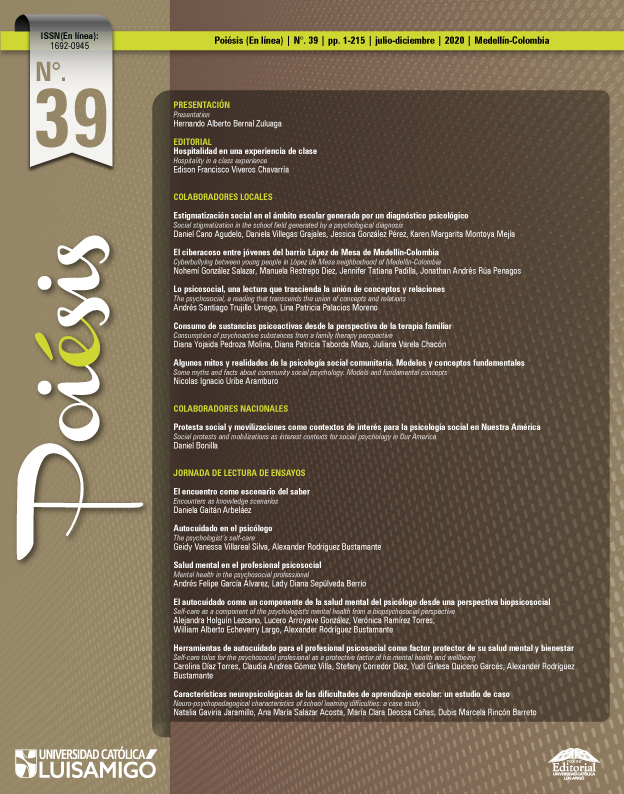Neuro-psychopedagogical characteristics of school learning difficulties: a case study
DOI:
https://doi.org/10.21501/16920945.3755Keywords:
Affective development, School failure, Psychopedagogy, Learning process, School performance, Treatment.Abstract
This article aims to present the neuropsychopedagogical characteristics of a child
with school and behavior difficulties. A case study was carried out with an 11-yearold
participant, who during the research was studying the fifth grade of elementary
school in a private educational institution in the municipality of Itagüí, Antioquia. The
instruments applied for the evaluation were: the KAUFMAN Brief Intelligence Test
(K-BIT), the EVALÚA Psychopedagogical Battery–5, the Depression Questionnaire for
Children (CDS) and a semi-structured interview for parents and teachers, related to
aspects of development, learning and behavior of the student. The results showed that
the child had an IQ within normal parameters and the main difficulties were found in the
social family context, which allowed to show that school performance is the result of the
interaction of different factors, which include cognitive, neurodevelopmental, emotional,
family and contextual components. It was also evidenced that behavioral difficulties
associated with the school context are not always related to learning or conduct
disorders. Obtaining this type of neuropsychopedagogical profiles is necessary in order
to establish relevant and effective intervention routes, which incorporate individual
cognitive characteristics, socio-affective ties, the social and school environment and
the student’s family dynamics.
Downloads
References
Alzate-Giraldo, L., Ocampo-Agudelo, M. C. y Martínez-Gómez, J. (2016). Aportes de la teoría ecológica a la construcción de la neuropsicopedagogía infantil. Revista Fundación Universitaria Luis Amigó, 3(2), 222-230. https://www.funlam.edu.co/revistas/index.php/RFunlam/article/view/2170/1676.
American Psychiatric Association (APA). (2013). Diagnostic and Statistical Manual of Mental Disorders (5ª edición), DSM-V-TM. American Psychiatric Publishing.
Antelm, A. M. y Gil, A. J. (2013). El estilo de aprendizaje del alumnado en riesgo de abandono escolar. En Fidalgo, A. y Sein-Echaluce, M. L. (eds.). Aprendizaje, innovación y creatividad (págs. 630-634). Fundación General de la Universidad Politécnica de Madrid.
Bejár, M. (2014). Una mirada sobre la educación: neuroeducación. Padres y Maestros, (355), 49-52. https://revistas.comillas.edu/index.php/padresymaestros/article/view/2622/2322
Brioso-Díez, Á., Contreras-Felipe, A., Corral-Íñigo, A., Delgado-Egido, B., Díaz-Mardomingo, M., Giménez-Dasí, M., Gómez-Vega, I., Oliva-
Delgado, A. y Sánchez-Queija, I. (2009). Psicología del desarrollo humano: desde la infancia a la vejez. McGraw-Hill/Interamericana de España. https://eduvirtual.cuc.edu.co/moodle/pluginfile.php/271201/mod_resource/content/1/libro%20UNED.pdf.
Bronfenbrenner, U., & Ceci, S. J. (1994). Nature-nuture Reconceptualized in Developmental Perspective: A Bioecological Model. Psychological Review, 101(4), 568-586. https://doi.org/10.1037/0033-295X.101.4.568.
Corchuelo-Fernández, C., Cejudo-Fernández, C. M. y Tirado-Morueta, R. (2019). Las conexiones entre apoyo familiar, escolar y el compromiso de los estudiantes en un centro de compensación educativa. Revista Española de Orientación y Psicopedagogía, 30(2), 46-52. https://doi.org/10.5944/reop.vol.30.num.2.2019.25337.
Durán, M. (2012). El estudio de caso en la investigación cualitativa. Revista Nacional de Administración, 3(1), 121-134. https://doi.org/10.22458/rna.v3i1.477.
Edel, R. (2003). El rendimiento académico: concepto, investigación y desarrollo. REICE. Revista Iberoamericana sobre Calidad, Eficacia y Cambio en Educación, 1(1 -9), . http://www.redalyc.org/articulo.oa?id=55110208
Escudero, J. M., González, M. T. y Martínez, B. (2009). El fracaso escolar como exclusión educativa: comprensión, políticas y prácticas. Revista Iberoamericana de Educación, 50(1), 41-64. https://dialnet.unirioja.es/servlet/articulo?codigo=3037638.
España, J. C., Pantoja, Z. y Romero, R. (2017). La predicción del rendimiento académico: regresión lineal versus regresión logística. Psicothema, 12(Su2), 248-525. https://www.redalyc.org/pdf/727/72797059.pdf.
Fernández, J. y Gual, A. (2017). Los procesos de implementación de los programas de mejora del aprendizaje y el rendimiento (PMAR). Perspectivas del profesorado, el alumnado y las familias. Revista Española de Orientación y Psicopedagogía, 28(3), 133-150. https://www.redalyc.org/pdf/3382/338254890007.pdf.
Fiuza-Asorey, M. y Fernández-Fernández, M. (2014). Dificultades de aprendizaje y trastornos del desarrollo: Manual didáctico. Editorial Pirámide
García-Madruga, J. A. (2006). Lectura y conocimiento. Paidós.
García-Vidal, J. González-Manjón, D. y García-Ortíz, B. (2004). Batería Psicopedagógica Evalúa-5. Editorial EOS.
Goodin, A. (2013). La evolución del aprendizaje: más allá de las redes neuronales. Revista Chilena de Neuropsicología, 8(1), 20-25. https://dialnet.unirioja.es/servlet/articulo?codigo=5756536
Jiménez, A., Alvarado, J. y Jiménez, A. (2000). La predicción del rendimiento académico: regresión lineal versus regresión logística. Psicothema, 12(Su2), 248-525. https://www.redalyc.org/pdf/727/72797059.pdf.
Lamas, H. (2015). Sobre el rendimiento escolar. Propósitos y Representaciones, 3(1),313-386. http://dx.doi.org/10.20511/pyr2015.v3n1.74.
Ministerio de Educación Nacional de Colombia (MEN). (2014). Modelos Educativos Flexibles: Nivelemos [Entrada en un sitio web]. Consultado el 15 de octubre de 2019 https://www.mineducacion.gov.co/portal/Preescolar-basica-y-media/Modelos-Educativos-Flexibles/346083:Nivelemos.
Propuesta de evaluación e intervención neuropsicopedagógica en población infantil. (2009). Presentación de DocPlayer. https://docplayer.es/3757109-Propuesta-de-evaluacion-e-intervencion-neuropsicopedagogica-en-poblacion-infantil-asesoras-de-investigacion.html
Rogero, J. (2012). El fracaso escolar, causas y alternativas. En la calle: Revista Sobre Situaciones de Riesgo Social, (21), 9-13. https://dialnet.unirioja.es/servlet/articulo?codigo=3832080.
Rosselli, M., Matute, E. y Ardila, A. (2010). Neuropsicología del desarrollo infantil. Manual Moderno.
Ruiz-Aristizábal, N., García-Carmona, C. E. y Martínez-Gómez, J. (2016). Neuropsicopedagogía: una mirada al concepto multifactorial del aprendizaje. Revista Fundación Universitaria Luis Amigó, 3(2), 231-237. https://www.funlam.edu.co/revistas/index.php/RFunlam/article/view/2171/1677.
Saldarriaga-Zambrano, P., Bravo-Cedeño, G. y Loor-Rivadeneira, M. (2016). La teoría constructivista de Jean Piaget y su significación para la pedagogía. Dominio de las Ciencias, 2, 127-137. https://dialnet.unirioja.es/servlet/articulo?codigo=5802932.
Santiuste, V. y González-Pérez, J. (2005). Dificultades de aprendizaje e intervención psicopedagógica. Editorial CCS.
Suárez-Orozco, C., Pimentel, A., & Martin, M. (2009). The Significance of Relationships: Academic Engagement and Achievement among Newcomer Immigrant Youth. Teachers College Record, 111(3), 712-749. https://www.researchgate.net/publication/237326463_The_Significance_of_Relationships_Academic_Engagement_and_Achievement_Among_Newcomer_Immigrant_Youth.
Villalobos-Martínez, J. L., Flórez-Romero, G. A. y Londoño-Vásquez, D. A. (2017). La escuela y la familia en relación con el alcance del logro académico. La experiencia de la Institución Educativa Antonio José de
Sucre de Itagüí (Antioquia). Revista Aletheia, 9(1), 58-75. http://www.scielo.org.co/pdf/aleth/v9n1/2145-0366-aleth-9-01-00058.pdf.
Yankovic, B. (2011). Emociones, sentimientos, afecto. El desarrollo emocional. Universidad Interamericana para el desarrollo [curso en Moodle]. https://moodle2.unid.edu.mx/dts_cursos_mdl/pos/E/CO/AM/06/Emociones.pdf.
Downloads
Published
How to Cite
Issue
Section
License
La revista y los textos individuales que en esta se divulgan están protegidos por las leyes de copyright y por los términos y condiciones de la Licencia Creative Commons Atribución-No Comercial- 4.0 Internacional. Permisos que vayan más allá de lo cubierto por esta licencia pueden encontrarse en http://www.funlam.edu.co/modules/fondoeditorial/ Derechos de autor.











